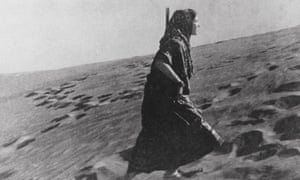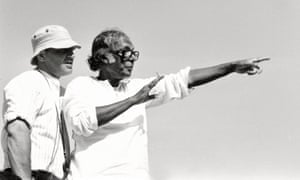In Memoriam
Mrinal Sen
Acclaimed Bengali film-maker who became one of Indian cinema’s most probing recorders of the country’s social fabric

For most people, Indian films mean Bollywood – rigidly formulaic Hindi-language musicals – but for others they mean exquisite art movies, mainly produced in Kolkata in the Bengali language. The latter industry, which came to be known as parallel cinema, is exemplified by the work of the near contemporaries Satyajit Ray, Ritwik Ghatak and Mrinal Sen.
Sen, who has died aged 95, benefited from the newly independent Bengali cinema after Ray, with his 1955 film Pather Panchali, proved it was possible to work outside the commercial system. Yet Sen, unlike Ray, did not restrict himself to Bengali, but made films in Oriya (Odia) and Telugu, as well as in Hindi.
A Marxist, Sen became one of Indian cinema’s most probing recorders of the country’s social fabric, in opposition to Ray’s European humanism. However, although his films attack the poverty and exploitation in Indian society, they are never worthy or simply didactic because of his often experimental style. Though few of Sen’s films gained wide distribution in the west, they won prizes at several festivals, including special jury prizes for In Search of Famine (1981) at Berlin and The Case Is Closed (1982) at Cannes.
He was born into a Hindu family in Faridpur, East Bengal (now Bangladesh), the son of Dinesh and Saraju Sen, and studied physics in Kolkata, before becoming a freelance journalist. From 1943 to 1947, he was involved with the Indian People’s Theatre Association, sponsored by the Communist party of India.

His interest in films started after he came upon Rudolf Arnheim’s Film As Art, a book on film aesthetics, though his interest remained mostly theoretical as he was forced to take up work as a medical representative in Uttar Pradesh for a couple of years. On his return to Kolkata, he got a job as an audio technician in a film studio, which was the beginning of his film career.
It took Sen more than 10 years of film-making before his work was seen and appreciated in the west. His international reputation started to grow with Bhuvan Shome, made in Hindi in 1969, among the first low-budget films to be financed by the National Film Development Corporation of India (then known as the Film Finance Corporation). A shrewd comedy about a bureaucrat widower, played by Utpal Dutt, who falls for a village girl, it launched the New Cinema movement in India.
Sen then entered a more political phase with his allegorical Kolkata trilogy consisting of Interview (1971) – a man loses a job because he cannot afford to buy a suit to wear; Calcutta 71 (1972), 40 years in the history of social deprivation told with Brechtian rigour; and The Guerrilla Fighter (1973), an analysis of the extreme left. “I wanted to make disturbing and annoying films, not artistic ones,” he claimed at the time.
Influenced by the French New Wave, Sen, dubbed “the Bengali Godard”, abandoned orthodox narrative cinema in the early 1970s, but returned in his later work to more local storytelling techniques.
The Royal Hunt (1976), Sen’s first film in colour, was set in the 30s in a remote village in British India where a curious friendship is struck up between a young tribesman and the English district commissioner, until the Englishman is forced to condemn the Indian to death, an act that causes riots. Drawing on the events of the Santhal rebellion of 1855, the film is a devastating attack on colonialism and paternalism.
In The Outsiders (1977), an anarchic old man opposed to work lives with his son on the outskirts of a village in conditions of grinding poverty. Set in an almost feudal context where the only power resides with the landlords, Sen’s film presents, without embellishment, a picture of the consequences of poverty.
And Quiet Rolls the Dawn (1979) was the first film in Sen’s thematically connected “absence trilogy” (along with The Case Is Closed, 1982, and Suddenly, One Day, 1989) that examines the implications of a person’s unexpected disappearance from a middle-class household on the family’s moral consciousness.
The event takes place one night in a Kolkata house, the family waiting anxiously for news of their daughter, also their breadwinner, who has failed to return home at the usual time. Sen’s mordant attack on social convention, shot in 21 days, is mainly confined to the house of the family who are trying to keep up appearances.
Both The Case is Closed and Suddenly, One Day continue the uncompromising social critique of entrenched bourgeois values and materialistic privilege that lead to indifference, discrimination and insularity. In the first, a young servant boy dies from carbon monoxide poisoning after having sought refuge from the cold weather in the warmth of an unventilated kitchen, and in the second, a sensitive professor walks out on his family, never to return.
In Search of Famine (1981) follows a film crew from Kolkata who arrive in an isolated village to make a movie about the disastrous famine of 1943. There, they encounter unexpected problems from the villagers who, caught in the grip of poverty and ignorance, are suspicious and hostile. The film is no less profound for perceiving the comedy in the situation of clashing worlds.
Sen’s later films are more contemplative and subdued, allowing audiences to draw their own moral conclusions. For example, in Genesis (1986), in which three nameless characters – the Farmer, the Weaver and the Woman – eke out a bare existence in a ruined and deserted village, the message is clear: the poor will remain poor, being always at the mercy of the powerful and prosperous.
There is an absence of the class struggle in Sen’s final film, This Is My Land (2002), which is a love story with bitter undertones. “With age and experience I have become more careful. I used to be politically overt when there was anger … But I wish I could start from scratch. I wish I could erase it all and start afresh like the professor in Suddenly, One Day, though I have an enviable position as a maker of good, bad and indifferent films.”
In 1953 he married Gita Shome, an actor, who later appeared in several of his films as Gita Sen; she died in 2017. He is survived by their son, Kunal.
Ronald BERGAN
first published in
www.theguardian.com/film/2019/jan/07/mrinal-sen-obituary



